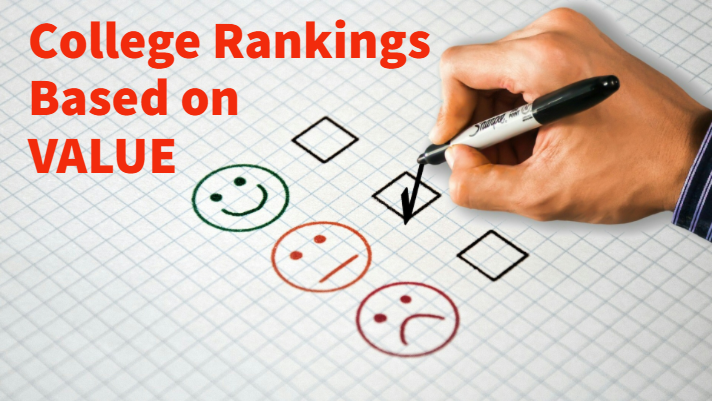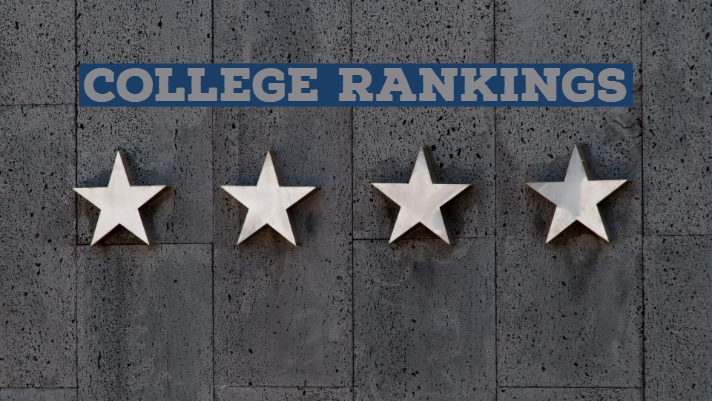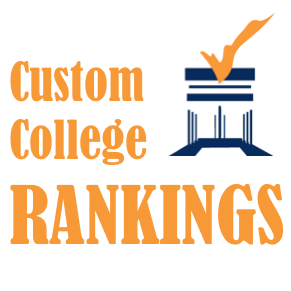US News, Forbes, USA Today, Princeton Review, and Niche are just a few of the many college rankings available for parents and students to review. Most college experts agree these college rankings should have little weight when choosing a college. But let’s get real for a moment, we all rank everything: from movies, to music, to restaurants, to hotels, to companies. Consumer reports ranks just about everything known to man: appliances, electronics, automobiles, and more. The New York Times Bestseller lists ranks books. Rankings are a part of our lives.
Continue reading Create Your Own College RankingsTag Archives: college rankings
College Rankings Based on Value

I’m not a fan of college rankings. Most are bought and paid for by the colleges and always have the Ivies at the top of the lists. You should never judge a college solely on its ranking, but there is one non-profit organization that ranks colleges based on the economic value added as being the improvement in earnings and employability of graduates; measured against the total cost of the education. Quite simply, colleges are ranked on their ROI (return on investment) by the Nonprofit Educate to Career.
Of course, your student won’t base their college choice solely on this information, but these rankings can help you and your student determine the value of your educational investment.
ETC President and founder Michael R. Havis states:
“Transparency and value in higher education is paramount – parents are telling us. Accordingly, we rank colleges by the outcomes of their graduates – including jobs and salaries, graduation rates, student loan payback rates, and other factors. ETC uses sophisticated statistical techniques to control for the quality of the students (we calculate the earnings value of high SAT scores and correctively weight our model for that value). Other rankings show a correlation between the SAT/ACT scores that a school accepts and the rank of the schools. They’re really ranking the students accepted by the colleges – while we are truly ranking colleges. Also, unlike other rankings – we do not accept any data from the colleges themselves, choosing to compile our data from only publicly available sources for the sake of transparency and impartiality”.
Some of the metrics used in calculating the ETC College Rankings Index are:
- Percentage of graduates employed in occupations which utilize their field of study
- Average salary earned by recent graduates, by school for each major category (adjusted for region, occupation and other variables)
- Percentage of persons employed within one year of graduation
- Major, referenced against similarly situated students at other institutions
- Graduation rate and the number of years to graduate
- Tuition- in state, net cost
- Loan default rates
- Other proprietary input variables which norm students to a common standard for each school and major
The ETC College Rankings Index is the standard for ranking colleges based on factors that families actually care about – ROI. Click the link to view the 2020 ETC College Rankings Index!
If you’re going to rely on rankings to make your college choice, ETC rankings are the ones to use because they are solely based on statistical data and not information the colleges provide.
Looking Past the College Names and the Rankings

When I talk to parents and listen to their stories about college prep, it’s hard not to be concerned. I’m concerned because it seems that college choice has become a competition–a competition among parents and a competition among students. It’s all about the prestige, the name, and the rankings and very little about the fit.
I recently participated in a discussion thread on the Grown and Flown Facebook page. A mother was concerned that her daughter was only considering applying to the Ivies. I tried to insert my advice on the matter and was attacked by so many parents whose students were either applying to these colleges or attending them. I was simply trying to point out that these colleges aren’t the “be all and end all” of colleges and there are so many other options out there to consider. Shame on me for disparaging these top-ranked universities.
Seriously though, it surprises me how many parents feel that their student can’t be happy at an unknown college or university. It astounds me how many parents will allow their student to attend one of these colleges and either go into debt themselves or allow their student to accumulate mounds of debt; because, news flash—these colleges only provide need-based aid to the poorest of families and merit aid to the best of the applicant pool. Your student may be accepted but offered no financial assistance.
How do you steer your student away from the these colleges?
If your student is a top candidate for an Ivy league college and you are willing to pay for it, then by all means, she should apply. But if you’re worried about finances or know that your student is applying for all the wrong reasons, it’s time to steer them away from these colleges.
The best way to do this is to draw the focus away from the Ivies and toward other colleges that offer the same benefits at a greater return for your investment. Encourage your student to visit colleges, talk to alumni, connect online with students from other colleges and start a conversation.
How do you find those “diamonds in the rough” colleges?
You can start by looking at the College That Change Lives website. Then move toward College Navigator and fill in some criteria that fits your student’s interests: location, size, major, merit awards, etc.. Look at the stats, financial aid awards, and student debt. After you have a list, do some digging. What is your student interested in studying? Is there a student body better suited for her? If she is at the top of the applicant pool will she have a better chance of winning merit aid?
How do you change your (and your student’s) mindset?
Visit. Interact. Start a dialogue with other colleges. Once your student sees the virtual cornucopia of colleges out there, it will be easier for you to move her toward the colleges that are a better fit. Once she realizes that it’s not about the name, but about the fit, it will be easier to add those colleges that fit instead of choosing one simply based on name or ranking.
With over 4000 colleges and universities in this country, it will serve you and your student better if you look at some of the lesser known colleges and examine their benefits. As my daughter did, she found her perfect match when she moved beyond the college with the ranking to the college that was a better fit for her academically, socially, and financially.
Wednesday’s Parent: 5 Reasons You Should Not Rely on College Ranking Lists
 Every year the college ranking lists roll out: U.S. News-America’s Best Colleges, Forbes list of America’s Top Colleges, Princeton Review’s The Best 379 Colleges and more. Parents often use these lists to create a list of dream colleges for their student. These lists may be jumping off points, but putting too much emphasis on them can harm your student.
Every year the college ranking lists roll out: U.S. News-America’s Best Colleges, Forbes list of America’s Top Colleges, Princeton Review’s The Best 379 Colleges and more. Parents often use these lists to create a list of dream colleges for their student. These lists may be jumping off points, but putting too much emphasis on them can harm your student.
Here are five reasons you should NOT rely on college rankings lists:
- Colleges and universities often cheat. Read this post from Lynn O’Shaughnessy about the cheating that goes on when colleges send incorrect, inaccurate and inflated data to the list makers. (Colleges and Universities That Cheat)
- Rankings don’t measure what sort of job a college or university is doing to graduate its students. No list even attempts to measure the education students receive or the quality of that education.
- Rankings encourage colleges to favor the rich. O’Shaunessy explains, “Many teenagers end up as collateral damage in the rankings race because schools that are more selective are rated higher, which encourages them to accept more wealthy students. US News awards schools which generate higher test scores and grade point averages from their freshmen. This focus on selectivity has been a boon for affluent high school students, who tend to enjoy better academic profiles. These teens can afford expensive test-prep courses and are more likely to have attended schools with stronger academic offerings.” The most elite schools boast that they reserve their aid to the families who need financial help to attend college, but most of these institutions offer admissions to a shamefully low percentage of needy students.
- The rankings encourage admission tricks. The US News rankings favor schools that spurn more students. Colleges increase rejection rates by recruiting students they have no intention of accepting.
- Rankings encourage debt. Rankings ignore how much debt students are incurring at the colleges. The colleges at the top of the lists are expensive and middle income students who aspire to these schools and are accepted are often forced to take out huge student loans in order to pay the high tuition. In this case, the prestige of the college often outweighs the cost in the mind of the student and the minds of the parents.
The bottom line: don’t rely on these rankings to create your college list. Create your own list by researching the data yourself. Websites like CollegeData and CollegeNavigator will provide you with data that is not inaccurately reported or inflated to rank the college higher on a list.
Read Wendy’s post: 7 Great Ways to Use College Rankings Lists
++++++++++++++++
Wednesday’s child may be full of woe but Wednesday’s Parent can substitute action for anxiety. Each Wednesday Wendy and I will provide parent tips to get and keep your student on the college track. It’s never too late or too early to start!
The bonus is on the fourth Wednesday of each month when Wendy and I will host Twitter chat #CampusChat at 9pm ET/6pm PT. We will feature an expert on a topic of interest for parents of the college-bound.
Wednesday’s Parent will give twice the info and double the blog posts on critical parenting issues by clicking on the link at the end of the article from parentingforcollege to pocsmom.com and vice versa.
Infographic: How College Rankings Work
College rankings are important to millions of incoming students a year, yet few actually know how the rankings are compiled. To give viewers a more clear look at what’s involved with compiling college rankings at the top rankings organizations, the editors at College Choice have created this graphic to explain methodologies.

Source: CollegeChoice.net
College Rankings
 U.S. News released their college rankings yesterday. There is always a great deal of emphasis placed on these rankings. Colleges boast about their possession in the pecking order and use it for marketing to students. But are these rankings accurate? What do they mean? What don’t they mean?
U.S. News released their college rankings yesterday. There is always a great deal of emphasis placed on these rankings. Colleges boast about their possession in the pecking order and use it for marketing to students. But are these rankings accurate? What do they mean? What don’t they mean?
Personally, I don’t put much weight on the U.S. News college rankings. These rankings are based on a subjective collection of information from the colleges themselves. Colleges have been known to pad their data, cheat on the reporting, and shift the data in their favor in order to rank high on the list.
Parents have been known to use the list to insist their student attend one of the high ranking colleges. But honestly, it’s just a way to claim bragging rights for the parents and has very little to do with the actual quality of the education for the price.
I always suggest that parents use more than one source when comparing colleges and gathering data.
Custom College Rankings
Custom College Rankings is an amazing site created to help you view all the college statistics on a spreadsheet and change the criteria of the spreadsheet as you view it. There are over 2900 colleges and universities with statistics for each gathered from the most recent data from the U.S. Department of Education.
ETC College Rankings Index
“The ETC College Rankings Index measures the improvement in employability and earnings that a particular college brings to its graduates, relative to students similarly situated at other colleges” – states Michael R. Havis, president and founder of the nonprofit Educate To Career, who adds – “Students and parents are focused on the value-added by going to a particular college and pursuing a specific area of study.”
College Factual
Unlike other college ranking systems, College Factual serves as a decision-making hub throughout the entire college search process, sharing outcomes-based data such as average student loan debt per student and default rates; how well colleges retain and graduate students; graduates’ starting salaries and earning potential; and return on investment based on cost of a degree.
In addition to these sites, you can use College Navigator, Cost of Learning, and College Data to gather more information. Never rely solely on one set of rankings. Use the comparison tools to make a wise college choice.
Custom College Rankings
For seniors, the college search is almost over. On May 1st, they will make their final college choice and look toward graduation and the fall when they become a college student.
For sophomores and juniors, the search has just begun. We’ve been learning about choosing a college over the last several weeks, with posts like: How to Choose a College, 7 College Search Apps for Parents and Students, and The Student Role in the College Visit. Students and parents are looking for tools that will help them as they begin that college list.
 What is Custom College Rankings?
What is Custom College Rankings?
Custom College Rankings is an amazing site created to help you view all the college statistics on a spreadsheet and change the criteria of the spreadsheet as you view it. There are over 2900 colleges and universities with statistics for each gathered from the most recent data from the U.S. Department of Education.
How does it work?
According to the site, you can use the spreadsheet in three ways:
- To find colleges by using as many filters as you like on the spreadsheet.
- To compare colleges by checking the boxes on the spreadsheet of the colleges you want to compare.
- To look up the statistics for a specific college.
Why create another college search site?
It’s creator, Susie Sadowsky holds a B.A. in accounting from Michigan State University and an M.S. in computer science from San Diego State University. After helping her two teenagers through the college admissions process, she created CUSTOM COLLEGE RANKINGS to give others what she wishes had been available to her.
Her motivation is to help parents with the college search process and save them some of the frustration that I encountered when helping my children through this process. After reading how US News ranks colleges she realized that she didn’t care about several of the criteria they were using. Thus she wanted to create her own rankings. She wanted to combine the search for colleges and data gathering into one central area. The best way to do this she determined was on a spreadsheet
Ms. Sadowsky explains what’s different about her rankings:
- My spreadsheet combines searching for colleges with comparing data of colleges all in one spreadsheet. Many websites are good at helping you narrow down your college list but the data for your list of colleges can only be found on separate pages for each college.
- Fine tuning of filters when searching for a college. One thing that frustrated me when I was using other college search websites is when it came to specifying your desired size the choices were limited.
- Other websites do not include the crime statistics.
- My website ranks all colleges together. Other websites like US News rank Small Liberal Arts Colleges, Large National Universities and Regional Universities separately.
Take it for a test drive and let me know what you think. Custom College Rankings is just another tool parents can add to their arsenal of college prep.
America’s Best Colleges? Ask China what they think.
With all the talk this week about the latest U.S. News and World Reports rankings of America’s Best Colleges, I thought it might be nice to put it all into perspective. I’m afraid, as usual, we have gotten a little too big for our britches in this country and our higher education system is suffering. According to a recent article in the Washington Post, America’s global rank in college completion is slipping.
Wendy David-Gaines (POCS Mom) adds some additional insight into the college ranking craze with her recent post about global college rankings.
Here’s a look at how China compares and what they are doing to lead the globe in education:

Created by: Online University Rankings

